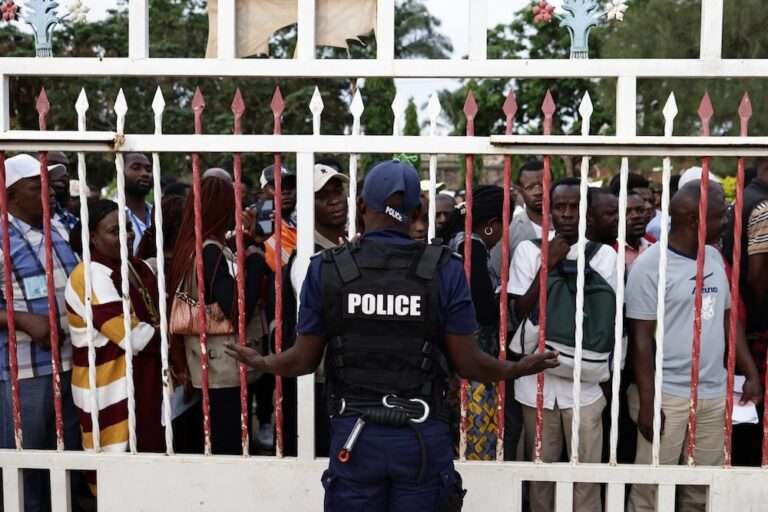(IFJ/IFEX) – The following is a 9 January 2007 IFJ press release: IFJ Condemns Dismissal of 15 Staff at Private TV Channel in DRC Due to Pay Dispute The International Federation of Journalists (IFJ) today condemned the retaliatory dismissal of 15 journalists and other employees at private television channel Global Television (Global TV) in the […]
(IFJ/IFEX) – The following is a 9 January 2007 IFJ press release:
IFJ Condemns Dismissal of 15 Staff at Private TV Channel in DRC Due to Pay Dispute
The International Federation of Journalists (IFJ) today condemned the retaliatory dismissal of 15 journalists and other employees at private television channel Global Television (Global TV) in the Democratic Republic of Congo (DRC) who were barred from their offices by management at the end of December after they asked for back pay.
On December 26, 2006, Global TV replaced 15 employees who were claiming payments for unremunerated work for periods of six to nine months. After making their claims for their back pay, the employees were dismissed and barred from their offices. Global TV refused to respond to their claims, the DRC’s National Union of Media Professionals (SNPP) said.
The IFJ is supporting the SNPP in its demand that the Global TV management reinstate the fired workers with full rights and contracts as stipulated under Congolese law since the employees had all fulfilled their job requirements in good faith.
“When media companies trample the labour rights of their employees, they put press freedom in grave danger,” said Gabriel Baglo, Director of the IFJ Africa Office. “Journalists who know they will be fired for demanding fair pay are extremely vulnerable to threats to their editorial independence. Journalists working at Global TV cannot stand up for themselves or their reporting when the company has made it clear that they will be fired for questioning management’s authority in any way.”
Clement Nzau, the co-ordinating director of Global TV, who is among the sacked workers, told Radio Okapi that he was the only employee with a contract. His contract was set to expire on December 31, 2006.
Global TV is owned by Mrs. Catherine Nzuzi wa Mbombo who has held high posts in Congolese politics, including terms as a government minister, governor of the capital city and president of a political party, and was a candidate in the recent presidential elections.
“We condemn this decision by Global TV management,” Baglo said. “These practices are illegal under Congolese law and we are outraged that Mrs. Nzuzi wa Mbombo would force her employees to work under illegal conditions without any pay for up to nine months.”
To date, Global TV management has refused to meet with the SNPP to respond to the workers’ claims. SNPP Secretary General Stanis Nkundiyé says that his union is committed to solving the dispute and getting justice for the 15 employees.
The IFJ represents over 500,000 journalists in more than 110 countries.


